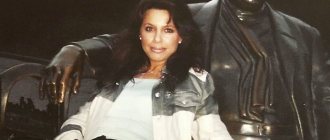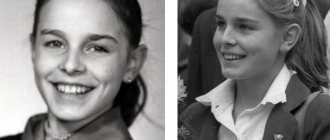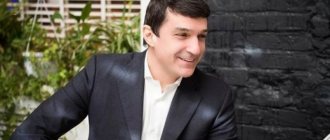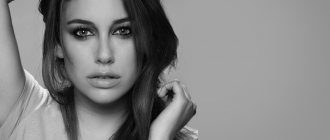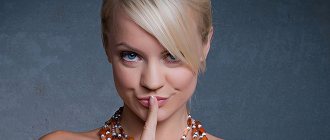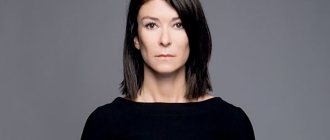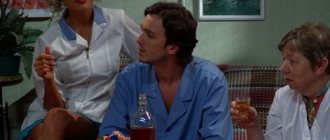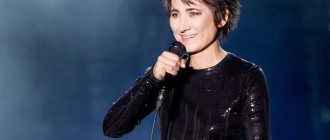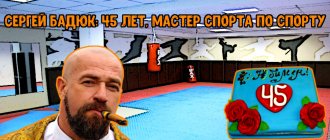Childhood and youth
Olga Sviblova was born on June 6, 1953 in Moscow . Father, Lev Sviblov , worked as an engineer at the Kurchatov Institute, designed parts for launch vehicle engines, had many medals and copyright certificates for inventions. Friends and strangers loved him for his radiance. Driven by his intuition for beauty, he made repairs himself, made designer items and was constantly fixing something. Mother, Tatyana Aleksandrovna , defended her PhD thesis in philology, taught German at 2 universities until she was 80, and then began going to film screenings and writing reviews.
At the age of 4, Olya fell ill with polio and lost her legs. The doctor recommended eating sauerkraut and exercising. In Maryina Roshcha, on an artificial skating rink, a girl with wobbly legs was supported by trainers on her sides, and her mother forced her to do pistol squats. I worked out, overcoming pain and weakness, which developed a strong-willed character.
Her parents did not restrict her freedom and, instead of giving advice, encouraged her to think for herself; as a result, the girl learned to think and make decisions on her own. From the age of 9, the girl studied at mathematics school No. 444, with the teachers of which she visited museums, the theater and archaeological excavations. In high school she liked biology.
In young age
Biography events
- 1970 – Driven by the desire to study mushrooms, I entered the Faculty of Biology at Moscow State University.
- 1973 – Sensitivity to smells prompted me to quit my studies and enroll in the Faculty of Psychology.
- 1978-1983 – Graduated from university. The knowledge she gained was useful in life, but she never worked by profession, since first her husband’s career as a poet, and then art, she was more interested in human relationships. In between working as a janitor or tutoring in chemistry and biology, she negotiated with magazines and publishing houses and established the necessary connections. Once I saw an exhibition of contemporary artists, which immediately hooked me. Since then I have become their fan.
- Since 1984 - curated art and photo exhibitions, festivals, competitions in the Fatherland and abroad. She started with one-day exhibitions in the hall of the Union of Artists, located on Kuznetsky Most. With the emergence of demand in the West for contemporary Russian artists, she began collecting their works for corporate collections and establishing international connections.
- 1987 – The documentaries “Krivoarbatsky Lane, Building 12” and “Architect Konstantin Melnikov” were released, in which Olga made her debut as a screenwriter. For the second she received a prize at the festival in Lausanne. In the same year, she graduated from graduate school with a degree in Psychology of Creativity.
- 1988 – Organized exhibitions in Finland. Her documentaries “Artists of Theater, Film and Television” and “Black Square” were shown in cinemas. On the set of the second of them, which tells about the Russian underground from 1953 to 1988, it was necessary to overcome the resistance of lighting designers and cameramen who did not consider it art; the struggle continued until the auction, at which prices for the works of these artists soared. The film collected awards in Cannes, Chicago and other foreign festivals and, in addition to being shown in cinemas, was shown several times on television in France, New York, Holland, and England.
- 1991 – She was the director of the released documentary film “In Search of a Happy Ending” about Russian artists of 1988-1991, which tells the story of how art can foresee the future. Not interested in politics, Olga predicted the coup in 1991, and the film won the Din Verni prize at the Pompidou Center. In the same year, she founded the “Art of the End of the Century” association and became its president.
- 1991-1992 – Collected a collection of Russian contemporary artists for the oil service Group RINACO.
- 1993 – Opened a French branch of the association.
- 1995 – As a director, she released the documentary film “Dina Verni”, which was awarded a prize at the UNESCO festival held in Paris.
- 1996 – Founded the tradition of photographic spring (“Silver Camera”) in the capital of Russia. The competition was held annually in 3 categories. She initiated the founding of the Moscow House of Photography (MDF), becoming its permanent director. It was the first art museum to emerge in ex-Soviet Moscow. MDF is also known as the Multimedia Complex of Contemporary Arts (MCAC), and later renamed the Multimedia Art Museum of Moscow (MAMM). MAMM organized itself and exhibited ready-made exhibitions; more than 1,500 of them have already taken place not only in the Russian capital, but also abroad.
- 1997-1998 – Artistic director of the “Sports in Photography” and “Moscow through the Eyes of Russian and Foreign Photographers” festivals.
- 1998-1999 – Organized the “Photobiennale”, held in even-numbered years at MAMM, and a similar international exhibition “Fashion and Style in Photography” - in odd-numbered years.
- 2006 – Opened the Moscow School of Photography and Multimedia named after. Rodchenko. The school trained photographers and artists working in the media and new media.
- 2007 – Curated the Russian pavilion at the 52nd Biennale of Contemporary Art, held in Venice. She completed similar work 2 years later.
- 2008 – Recognized as one of the most successful women by Career magazine.
- 2011 – Entered the Top 100 of the magazine “Le journal des Arts” as one of the most influential people in the art world.
- July 2009 – Helped to open the project “History of Russian Costume”.
- 2016 – Curated an exhibition on contemporary Russian art of 1950-2000, held at the Pompidou Center.
- 2021 – In April, at the gala presentation of the new crossover, held at MAMM, I focused the attention of those present on the stylish design of the Hyundai model. And on June 3, she talked about the most prominent photographers of the current summer biennale - Erwin Olaf and Bill Cunningham.
Olga Sviblova. Outlier
Founder and director of the Moscow House of Photography museum and the Multimedia Art Museum; film director; curator; Academician of the Russian Academy of Arts; screenwriter. Included in the international ranking of the 100 most influential people in the art world according to Le journal des Arts
– Olga, you were born on June 6, on the same day as Pushkin. Do you feel any special connection with the poet?
- None.
– Do you like Pushkin?
“I love him now, but I really didn’t love him when I was a child.” I think it was a confrontation, like many teenagers. I liked Lermontov better. But the older I got, the more I loved Pushkin. Now I adore him and know for sure that I do not have Arab blood. I'm not a little black. I would be glad, but no.
– When was the last time you re-read it?
- About two months ago. “Little tragedies” are my favorite.
– Since you are the founder and director of the Moscow House of Photography and Multimedia Art Museum, I want to ask you “as an artist of an artist” – can you draw?
- No.
– Do you like to take photographs?
- I love. But I never show it. I do them solely for the soul. And I have already moved away from digital cameras. What I'm filming today, I'm filming on my phone. When I have time, I post it on Instagram. When I’m not there, I live peacefully. And they accumulate thousands on the phone.
– How do you feel about the fact that now everyone around is photographing literally every step they take, then posting the photos on social networks?
- I’m fine. Photography is Media. And it doesn’t matter at all what you shoot with. It is important to understand why you are doing this and set the tasks correctly. Some people succeed and some don't.
In addition, the text lives in context. Photography is also text. And she lives in different contexts: she lives in social networks, she lives in a magazine, she lives in an exhibition space. Her life depends only on the context. If the person who made it has a head and a message, it will live.
It's like when a person draws. Anyone talks about something. And in the 19th century, almost every person from a decent family used watercolor as a form of literacy. This does not mean that everyone became great artists.
– Your son is a photographer. In his childhood and youth, did he have an alternative not to become a photographer?
There were many alternatives. His dad, Alexey Parshchikov, is a wonderful poet. He and I took our son to the cinema all the time. That's why he chose cinema as a profession. Graduated from VGIK, became a cameraman, works in cinema. And it works well. The films he made won awards.
– Do you have a good relationship with him?
- They are different. Emotional. But they exist. It is very important. We are in contact all the time.
-Are you proud of him?
- I'm rather worried.
I understand how difficult it is to be an artist.
But I am proud that my son makes me happy so far. If I didn't like what he was doing, I probably would have tried to rebel. Although I understand that this is useless. People always choose for themselves.
– Is it difficult to be an artist?
Today it is difficult to be a banker. 5-7 years ago I saw a huge number of journalists, translators, biologists who became investment bankers. And today I see investment bankers who have become anything, artists, producers, etc.
But being an artist, living in an art environment, is a double risk. Not only material risk, if there is nothing to feed the family, but also moral risk. For an artist, the moment of creativity itself is much happier than seeing his work in major museums, at competitions, or receiving a prize. The moment of creativity is the most important. He cannot be influenced. Sometimes it goes, sometimes it doesn’t. Any profession requires creativity. But the artist has no other profession and this makes his life even more difficult. Regardless of whether I like the author or not, it is better to help the artist.
And if it is possible not to be an artist, then it is better not to be.
– Are you ready to talk about your new project?
– Over four days in London, I had at least 14 meetings from which something was sure to germinate. But it’s too early to announce anything.
– When a new project is being prepared, what is most important? Will it work or won't it work? Will it shoot or won't it shoot? Will they accept or will they not accept? Will there be funding?
- Together.
My son Timofey is opening an exhibition at MMOMA “Figures of Intuition”, dedicated to his father Alexei Parshchikov, a wonderful poet who has a cycle of poems with the same name.
So, I believe that the figure of intuition leads us through the world first. She comes first, and everything rational and visual comes after her. But in addition to intuition, you must also have experience in order to calculate the entire spectrum. Including the psychology of the artist, which is always costly. You always give yourself differently to different artists. This is both time and mental strength. This is happiness in the end.
All possibilities must be calculated.
– You are a psychologist by training. Graduated from the Faculty of Psychology of Moscow State University. Does this help you in working with artists? Are you good at reading people?
Any person who has graduated from the Faculty of Psychology has certain problems. If you don’t have a problem understanding yourself and developing yourself, you shouldn’t go to this faculty.
This is a very good liberal arts education. It will not help you learn to understand people and yourself. But he will teach you to treat yourself with understanding, even with a certain patience. Because impatience with oneself is also a radical-normal property. If you start to eat yourself, you become dangerous to yourself and to others. You have to somehow always find a balance with yourself and with other people. You have to understand that you can’t change people. Even oneself can be remade to a very limited extent. You need to accept people and yourself as they are and rejoice, admire everything beautiful that is around.
– Do you love London?
- Now yes. I had different stages of relationship with London.
I love the sun in London. It comes out all the time. When it appears, it’s like “Bam”! There is no such sun anywhere. Not in the south, not in Paris - the city of light. Pure London sunshine.
– Do cities have a smell? What do your favorite cities smell like?
– Paris doesn’t smell like anything. That's why I love him. And New York smells! And in different ways. And it's not always pleasant. And London... I love early, early spring in London. It seems to me that she is the first to come to this city. When the leaves have not yet opened and there is some amazing smell of azon and freshness.
I have loved London very much for the last 10 years. I think this is the Place of energy today. I don’t know how long this energy will last. Energy is a nomadic substance. He always chooses different places. She was once in Paris. At the beginning of the twentieth century. And she was definitely in New York in the sixties and until the late 80s. This energy was in Moscow from the mid-90s to the mid-2000s. And it's still in London.
Of course, I don’t know where she will move next, but we will follow her.
– Are your travels more related to work or...?
– They are always related to work.
– Don’t you ever want to just run away somewhere?
- No. I never want to run away anywhere. When I need something for myself, I am very conservative - I have been vacationing in the same place for 23 years. On our houseboat in the Camargue swamp. Now that I've lost my husband, I'll probably never go back there again. I will look for the same settled place and the same wild nature. There we were completely alone on a thousand hectares. Complete loneliness and animals with whom you communicate literally at arm's length.
– Do you like animals?
– I studied at the Faculty of Biology for three years. It was the best time of my life. Because more than anything in the world I love plants and animals. Even more art. When I was asked as a child what I want to become? I answered - a dog shepherd.
I came up with such a wonderful job for myself. I really wanted a dog. Even then I understood that it was easier with them than with people, more predictable. More contact.
And when I was seven years old, I “earned” myself a dog. Before that, I collected all the stray dogs in the area and they lived in my barn. And I wanted them to live with me. But I couldn’t bring them into our 14-meter room, where the four of us lived. And so, when we moved into a new apartment, our parents set a condition. If I go to music school, they will allow me to have a dog as a reward. My mother graduated from the Gnesensk School and it was very important for her that her daughter study music. Having absolutely no hearing, I prepared for admission. My dad taught me to sing “Across the Valleys and Over the Hills,” I performed it brilliantly and was accepted.
That summer, the boys at the dacha wanted to set a dog on me, and I became friends with it and took it with me to Moscow. This was my first and most beloved dog. Her name was Button. She was h
bottom mongrel. In her registration passport it was written - BP - mongrel. And I called her Belgian Pinscher! Then almost all the time, when possible, I had dogs.
– As a conservative person, do you easily get along with people? Do you make new friends?
- Yes, sure. But friends, these are not the people you need to communicate with every day. They just live in you. If in your youth friends are those with whom you endlessly communicate, now, it is often just a touch. And this is enough to become friends and know that you have a friend. Sometimes on the other side of the world.
– Your main rule: “What is interesting in life is what falls outside the rules” refers to unofficial culture. What about you? Are you “out of line”?
Photo by Egor Piskov
“I don’t think I fit in anywhere.” And since childhood. It is not simple. It could have been painful and destructive if I had not found a profession where it helps.
– Are you a person with a strong position?
– I am a doubting person. I'm constantly lost, constantly doubting. For me, getting ready is a huge effort. But since my profession is to make decisions, I am forced to make them.
– Do you say “Yes” or “No” more often?
– I speak quickly if I know for sure “Yes” or “No”. And when I need to think, I can think for a very long time. I still have three answers: “Yes,” “No,” “I’ll think about it.” Sometimes I think for many years.
Personal life
Olga became a bride for the first time at the age of 18, but the approaching wedding did not bring joy. The groom wanted children, and she wanted a dog. But the outfit was bought and the hall was paid for, and registration took place, but that same evening she ran away and divorced 3 months later.
A year later she married the talented poet Alexei Parshchikov . Like many creative people, he had his head in the clouds, and had to take care of everyday life on his own. Fascinated by her husband’s poetry, the woman served her creator, could wait for hours in the cold and work as a janitor. In 1983, son Timofey , who is known as a photographer, poet, cameraman and screenwriter of short films. After 18 years, Alexey began to drink and stopped writing. With the cessation of creativity, food for the mind disappeared, and as a result, a divorce was filed.
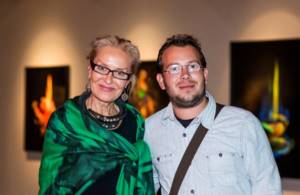
With son Timofey
In 1990, insurer Olivier Morand . They met in his cultural center, and he offered her a job - to help organize a center for French art in Moscow. With the gift of a fax, through which personal letters were regularly sent, a powerful regular supply of love . He restructured Sviblova’s taste, furnished her apartment and built country houses in the Moscow region and in France.
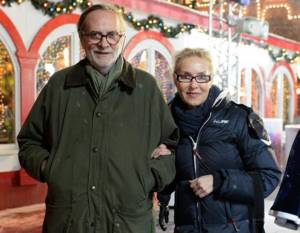
Olga Sviblova and Olivier Morand
Wife. Love story
Her gift is to admire the gift of others. She does this masterfully not only within the walls of the Multimedia Art Museum she created, but throughout the world. Her curatorship in the art world began with meeting her future husband, poet Alexei Parshchikov, and her dream of opening a photography museum came true in her marriage to philanthropist Olivier Morand. Guest of Kira Proshutinskaya in the program “Wife. Love Story" was directed by art critic and director Olga Sviblova.
Overcoming
Olga Sviblova was born into an intelligent Moscow family. Her father is a design engineer, and her mother is a German language teacher and philologist. They lived in a communal apartment - in one room, without a bath and with a shared kitchen. The girl's favorite pastime was to gather all the street dogs in the yard and feed them. She even invented dog language and decided that she would be a dog herder. In order for her parents to allow her to have a pet, she had to fulfill one condition - to enroll in a music school. It wasn't easy, but it was worth it - she finally got a four-legged friend.
As a child, many things were not easy for her. The fact is that at the age of four, little Olya suffered from a severe form of polio, which caused serious complications on the bones and joints - the girl moved with great difficulty. Figure skating, daily exercises through pain, her mother’s perseverance and her own perseverance helped her practically learn to walk again...
At the mathematics school where Olga studied, there were only 6 girls out of 42 students, who, for obvious reasons, were surrounded by male attention.
“There was a boy in our class, Sasha, an athlete who never showed me any signs of attention. One day I come home from the institute and see him, dead drunk, sleeping on the bed. Mom says: “Sasha Novichkov came, asked me for your hand in marriage, said that you can go on reconnaissance missions with your daughter.” For me this is the biggest compliment. I believe that you need to live in such a way that you can go on reconnaissance missions with you.
Married to Russian poetry
Once, during a student potato-picking trip, Olga was shown a notebook with poems by Alexei Parshchikov. What she read shocked the girl so much that she instantly fell in love with the poet’s work. Their meeting place was the Moscow State University dormitory, where creative youth gathered. Olga and Alexey celebrated the New Year together and never parted again. The wedding took place when Sviblova was 19 years old, and the wedding gift to the groom from the bride was a hand-knitted scarf with the monogram “MM,” which meant “Master from Margarita.”
“I married Russian poetry, I understood that I would not be bored,” recalls the heroine of the program.
Olga became her husband’s main assistant and did a lot to make people know about him. So that her husband could write poetry in peace, she got a job as a janitor, and she calls this time very happy. After ten years of marriage, the couple had a son, Timofey.
“For a long time I didn’t want to disturb Alyosha; it seemed to me that the poet should give all his attention. It is important to understand what underground culture is. In this culture, many people survived because they had good wives. Others simply broke. Ten years later, we decided to deliberately have a child, and I knew that we would not live together. But I didn’t want anyone else’s child.
Why did the marriage break up after 18 years? What does Olga fear most in life? Why couldn't Parshchikov watch Sviblova's documentary? The guest told Kira Proshutinskaya about this.
To love as it never happens
One day Olga wished for love to be sent to her. And higher powers heard her. True, it happened in a completely unexpected place. Once in Paris, a friend invited Sviblova to go to an art center created by the French philanthropist Olivier Morand. The guest was fascinated by the space she saw; she wanted to meet the person who made it. The meeting turned out to be so warm that Olivier invited Olga to help him create a center for French contemporary art in Moscow. The working relationship quickly developed into a romantic one - Moran made a marriage proposal a few months after they met.
“We talked with Parshchikov for 18 years, but with Olivier we spoke little, and in this silence there was some kind of fantastic attentiveness, such a depth of vision that I had never had. He rebuilt both me and my taste to a different wavelength. He loved me very much - probably in a way that never happens. And I loved it too. For the sake of his beloved, Olivier converted to Orthodoxy, and they soon got married. The couple were happily married for 23 years, until the moment when Moran passed away... How did Olivier look after Olga and what does the fax have to do with it? What is a woman's true calling? Why did the guest have a difficult relationship with her mother? Why does she hate the bathhouse? What do her friends and colleagues Viktor Fogelson, Igor Burenkov, Elena Lungina think about Olga? The answers are in Kira Proshutinskaya’s author’s program “Wife. Love story".
Maria Feoktistova
